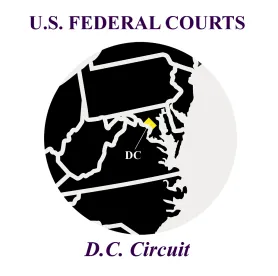A DC Circuit Court of Appeals challenge to a recent Financial Industry Regulatory Authority (FINRA) enforcement action brings into question whether FINRA should be held accountable to constitutional restrictions on state action. This challenge, if successful, could have far-reaching implications on the constitutionality of FINRA's regulatory program and enforcement function, and by extension, the regulatory programs and enforcement functions of other self-regulatory organizations (SROs) such as the derivatives industry's National Futures Association (NFA).
On July 5, the US Court of Appeals for the DC Circuit granted an emergency injunction blocking FINRA from expelling Alpine Securities Corporation (Alpine) through its expedited hearing process pending Alpine's appeal challenging the constitutionality of FINRA's enforcement action.1 The court agreed that Alpine is likely to succeed on the merits based on the argument that FINRA's hearing officers exercise "significant executive power" without being appointed by an appropriate government body under the Appointments Clause, in violation of the US Constitution.
While the constitutional issues have yet to be fully litigated, Judge Justin Walker, in a concurring opinion, reasoned that FINRA's hearing officers are "near carbon copies" of the SEC's administrative law judges (ALJs), relying on the Supreme Court's analysis in Lucia, and that "if the ALJs in Lucia exercised 'significant' executive power, then FINRA hearing officers probably do too." In Lucia, the Supreme Court held that ALJs within the SEC "exercised significant authority" because they had discretion to exercise an important government function — enforcing the nation's securities laws — and, as such, were officers of the United States subject to the Appointments Clause."2
Judge Walker further identifies two constitutional issues: (1) FINRA's hearing officers are not appointed by a government body pursuant to the Appointments Clause; and (2) such officers, despite being private employees, cannot be removed by the SEC except for cause, thus infringing on the President's ability to execute the laws.
Significantly, Judge Walker asked "[d]oes it matter that FINRA hearing officers are employees of a nominally private company?" Judge Walker answered "probably not" because "a private entity can qualify as a state actor . . . when the government compels the private entity to take a particular action." The fact that this reasoning is being applied by the DC Circuit is particularly noteworthy because of the status of this Circuit as the court to which parties may appeal virtually any administrative action.
Implications
If Alpine ultimately prevails, the regulatory implications for FINRA, and by extension, other SROs, would likely be significantly disruptive. For one, FINRA would essentially be a state actor enforcing federal law — the Securities Exchange Act of 1934, as amended — in addition to its own rules. The idea that FINRA is becoming increasingly governmentalized is not new. However, the Supreme Court has yet to explicitly rule on this state actor issue.3
As a state actor, FINRA may be subject to new constitutional restraints including Fifth Amendment due process requirements impeding the efficiency and independence FINRA currently has as an SRO. FINRA may no longer be able to bring Failure to Cooperate actions against respondents who choose to exercise a Fifth Amendment right to silence. FINRA also may lose many of the other advantages that come with being an SRO. For example, it is a consistently held principle that no statute of limitations applies to disciplinary actions of SROs like FINRA.4 If FINRA is held to be a state actor, FINRA would be subject to the limitations period, which could impair FINRA's ability to discipline its members. FINRA's hearing officers also may become increasingly obsolete under this new regime. Hearing officers will not be able to hold hearings unless they are appointed by a government body under the Appointments Clause raising concerns that the appointing government body may have inappropriate influence over the hearing.
Perhaps more radically, if Judge Walker's analysis were adopted in a final decision, it would call into question the constitutionality of FINRA's entire enforcement apparatus. Although Alpine's case challenged the constitutionality of FINRA's hearing officers, the same reasoning would likely mean FINRA's Director of Enforcement was unlawfully appointed. That is, if the Appointments Clause applies to FINRA, the Director of Enforcement could plausibly be characterized as an "inferior officer," rather than a mere employee.5 The same appointment infirmities identified by Judge Walker with respect to FINRA's hearing officers seemingly apply equally to the Director of Enforcement, who is not hired in a manner consistent with the Appointments Clause and is only subject to removal by the SEC for cause. That conclusion would place in doubt not simply proceedings pending before FINRA hearing officers, but instead all enforcement activity authorized by the Director, including the routine issuance of information requests and the taking of on-the-record testimony.
It remains to be seen how this case will proceed and the implications it will have going forward on FINRA's regulatory regime. If Alpine prevails on the merits after full litigation, this case could be appealed to the Supreme Court, thus bringing the issue of when and whether an SRO is a state actor even more prominently to the forefront.
1 Alpine Securities Corp. v. Financial Industry Regulatory Authority, No. 1:23-cv-01506-BAH (D.C. Cir. Jul. 5, 2023) (available here).
2 Lucia v. SEC, 138 S. Ct. 2049, 2051, 2053.
3 Compare dicta in Intercontinental Indus., Inc. v. American Stock Exch., 452 F.2d 935, 941 (5th Cir. 1971) ("The intimate involvement of the Exchange with the [Commission] brings it within the purview of the Fifth Amendment controls over governmental due process.") with First Heritage Corp. v. National Ass'n of Secs. Dealers, Inc., 785 F. Supp. 1250, 1251 (E.D. Mich. 1992) (arguing that NASD is not a state actor).
4 In the Matter of Department of Enforcement, Complainant, v. Robert R. Tweed, Respondent, FINRA National Adjudicatory Council Decision, Complaint No. 2015046631101, December 11, 2019, https://www.finra.org/sites/default/files/fda_documents/2015046631101%20Robert%20R.%20Tweed%20CRD%202339324%20%20NAC%20Decision%20va.pdf.
5 See, e.g., Buckley v. Valeo, 424 U.S. 1, 126 ("[A]ny appointee exercising significant authority pursuant to the laws of the United States is an 'Officer of the United States,' and must, therefore, be appointed in the manner prescribed by [the Appointments Clause]"); Free Enter. Fund v. PCAOB, 130 S. Ct. 3138, 3179 (2010) (Breyer, J., dissenting) (noting the category of "inferior officers" may include individuals "invested by legal authority with a portion of the sovereign powers of the federal Government" (quoting Office of Legal Counsel, Officers of the United States Within the Meaning of the Appointments Clause (April 16, 2007)).








 />i
/>i

